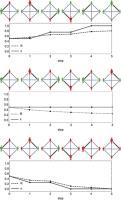Impact of resource availability and conformity effect on sustainability of common-pool resources
IF 6.3
3区 综合性期刊
Q1 Multidisciplinary
引用次数: 0
Abstract
Sustainability of common-pool resources hinges on the interplay between human and environmental systems. However, there is still a lack of a novel and comprehensive framework for modelling extraction of common-pool resources and cooperation of human agents that can account for different factors that shape the system behavior and outcomes. In particular, we still lack a critical value for ensuring resource sustainability under different scenarios. In this paper, we present a novel framework for studying resource extraction and cooperation in human-environmental systems for common-pool resources. We use microscopic update based on agent-based modelling and macroscopic ordinary differential equation based on game theory to explore how different factors influence the players’ decisions and the resource outcomes. These factors include resource availability, which accounts the environmental condition and the collective actions of the players; conformity effect, which captures for the social influence and peer pressure that the players experience; and their balance, which reflects a trade-off between environmental condition and social influence. We identify critical values for ensuring resource sustainability under various scenarios and parameter configurations. We demonstrate the observed phenomena are robust to the complexity and assumptions of the models and discuss implications of our study for policy and practice, as well as the limitations and directions for future research.

资源可得性和整合效应对公共池资源可持续性的影响
公共资源的可持续性取决于人类和环境系统之间的相互作用。然而,仍然缺乏一个新的和全面的框架来建模公共池资源的提取和人类代理的合作,这可以解释塑造系统行为和结果的不同因素。特别是,我们仍然缺乏在不同情景下确保资源可持续性的临界值。在本文中,我们提出了一个新的框架来研究人类-环境系统中共同池资源的资源开采与合作。本文采用基于智能体模型的微观更新和基于博弈论的宏观常微分方程来探讨不同因素如何影响参与者的决策和资源结果。这些因素包括资源可用性(游戏邦注:这与环境条件和玩家的集体行动有关);从众效应,捕捉到玩家所经历的社会影响和同伴压力;以及它们的平衡,反映了环境条件和社会影响之间的权衡。我们确定了在各种场景和参数配置下确保资源可持续性的临界值。我们证明了观察到的现象对模型的复杂性和假设是稳健的,并讨论了我们的研究对政策和实践的影响,以及未来研究的局限性和方向。
本文章由计算机程序翻译,如有差异,请以英文原文为准。
求助全文
约1分钟内获得全文
求助全文
来源期刊

Fundamental Research
Multidisciplinary-Multidisciplinary
CiteScore
4.00
自引率
1.60%
发文量
294
审稿时长
79 days
期刊介绍:
 求助内容:
求助内容: 应助结果提醒方式:
应助结果提醒方式:


